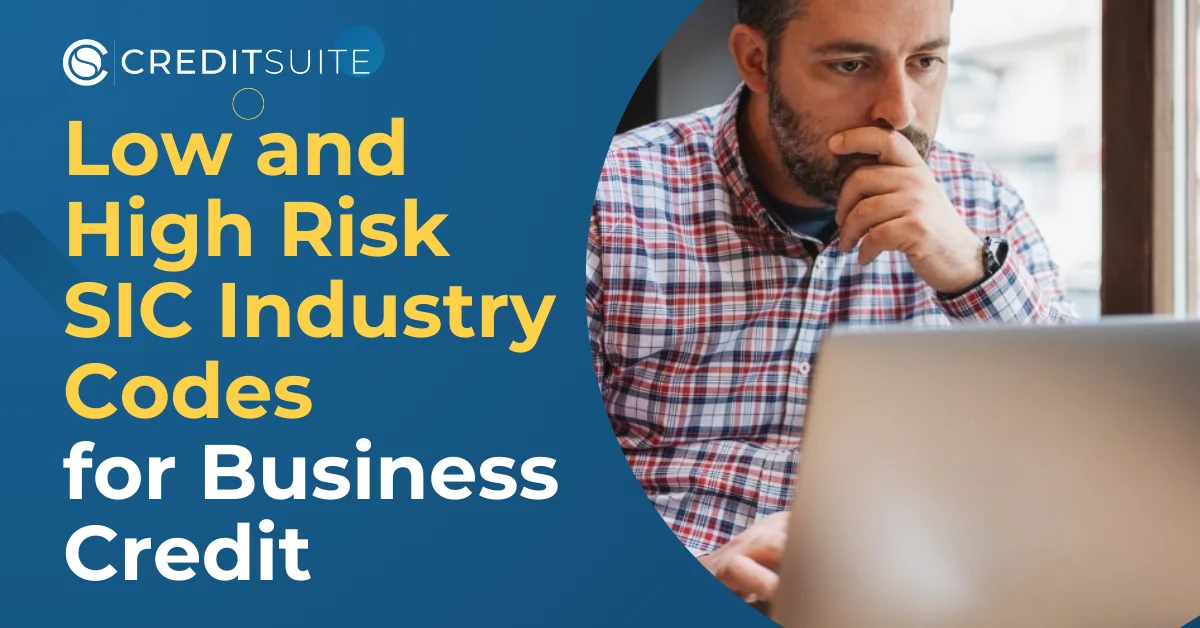The harsh truth about qualifying for financing is that banks can turn down your application solely based on your industry.
That’s why we compiled lists of both high risk and low risk SIC codes. We’ll start off with the low risk codes: the list of SIC codes that banks like.
Low Risk Industry Codes: The SIC Codes the Banks Like
Lower risk industry codes include:
- Plastic Products, Not Elsewhere Classified – 3089
- Telephone Communications, Except Radiotelephone – 4813
- Groceries and Related Products, Not Elsewhere Classified – 5149
- Miscellaneous General Merchandise Stores – 5399
- Miscellaneous Apparel and Accessory Stores – 5699
- Insurance Agents, Brokers and Service – 6411
- Linen Supply – 7213
- Computer Programming Services – 7371
- Business Services, Not Elsewhere Classified – 7389
- Bands, Orchestra, Actors, and Other Entertainers and Entertainment Groups – 7929
Which SIC Codes Get You Denied: SIC Codes List
The SIC Code (Standard Industrial Classification) is a part of a business classification system.
A Standard Industry Classification code, or SIC is a four digit numerical code which is assigned by the U.S. government to businesses, to make it easier to identify the primary activity of the business. It is an indicator of the kind of business a company is in.
The Securities and Exchange Commission developed this system. For example, if your company makes tires and/or inner tubes, then your SIC code would be 3011.
The numbers are somewhat intelligent in that there are ranges of industry groups which correspond to the first of the four digits, such as manufacturing corresponds to four-digit SIC codes which start with either a 2 or a 3.
The combination of the first and second digits then defines the major industry group. In our example, 30 will designate ‘Rubber and Miscellaneous Plastic Products’. So this can lead to the question: how many SIC codes are there?
How to Find SIC Codes
You may be wondering: how do I find SIC codes? There is a SIC codes list. The SIC code’s digits are grouped to identify the industry and industry group. The first two digits in the SIC code identify the major industry group, the third digit identifies the industry group and the fourth digit identifies the industry.
In fact, the Internal Revenue Service will use the SIC code that you select. This is in order to determine if your business tax returns are comparable to the other businesses in your industry. Hence, if your tax deductions do not reasonably resemble the other businesses in your industry, your business could be audited.
Furthermore, some companies may be labeled high-risk when they do not select the right SIC codes to classify their company. However, if you understand how the business classification system works, then you can choose the correct code on your first try.
An Alternative to SIC Codes: North American Industry Classification System Codes (NAICS)
The North American Industry Classification System (NAICS) is another business classification code.
This code classifies business establishments for the purpose of collecting, analyzing, and publishing statistical data related to the U.S. economy. NAICS industry codes define establishments based on the activities in which they are primarily engaged.
The NAICS puts out its own list of high-risk and high-cash industries. Higher risk industries on the list include casinos, pawn shops, and liquor stores, but also automotive dealers and restaurants. One of the bigger differences in the two systems is the NAICS does not distinguish between online and offline or hybrid businesses in an industry.
OSHA requires injury and illness reports from certain high-risk industries.
SIC Codes Search: Restricted industries (automatic decline) include:
- Ammunition, Except for Small Arms – 3483
- Check Cashing Agencies – 6099
- Petroleum Refining – 2911
- National Commercial Banks – 6021
- Gaming or Gambling Activities – 7999
- Loan Brokers – 6163
- Pawn shops – 5932
- Political campaigns, candidates, or committees – 8651
- Correctional Institutions – 9223
- Night Clubs – 5813
SIC Codes Lookup: High-Risk Industries (subject to stricter underwriting guidelines):
- Agriculture or forest products – 0831
- Boat sales – 5551
- Courier services – 4215
- Computer and software related services – 7371
- Dry cleaners – 7216
- Entertainment (adult entertainment is to be considered restricted) – 7929
- General contractors – 1522
- Gasoline stations or convenience stores (also known as c-stores) – 5541
- Healthcare; specifically nursing homes, assisted living facilities, and continuing care retirement centers – 8052
- Special trade contractors – 1799
- Hotels or motels – 7011
- Jewelry, precious stones and metals; wholesale and retail – 5094
- Limousine services – 4111
- Long distance or “over-the-road” trucking – 4213
- Mobile or manufactured home sales – 2451
- Phone sales and direct selling establishments – 5999
- Real estate agents/brokers – 6531
- Real estate developers or land sub-dividers – 6552
- Restaurants or drinking establishments – 5812
- Software or programming companies – 7371
- Taxi cabs (including the purchase of cab medallions) – 4121
- Travel agencies – 4724
Between an NAICS Code and SIC Business Codes – Which Code is in Use?
They both are. However, the SIC code system is phasing out and NAICS will replace it. But for the moment, assume they are both in play, as the transition has not yet finished. These coding systems are similar but not identical.
But which SIC codes get you denied?
Lenders, banks, insurance companies and business credit reporting agencies use the two business classification systems to determine if your business is a high-risk industry classification. This means that you could get a denial for a loan or a business credit card based on your business classification.
Some SIC codes can trigger automatic turn-downs, higher premiums, and reducing credit limits for your business. This means it’s harder to get business funding.
Which SIC Codes Get You Denied: Industry SIC Codes and Risks
When considering any aspects of a business, risk has to be a major factor. There are inherent issues in every single industry. Crops fail, or lease terms go up too high so a company has to move. Or tariffs or even a war make importing less reliable. And don’t forget about pandemics.
But some businesses are considered to be risky by their very nature. And this is the case even if everything else goes off like a hitch and the business is prospering. Risk is inherent within these business types. Therefore, even if your business doesn’t feel risky, it just might be anyway.
The SIC Code List: Why Risk Matters
The biggest reason why risk matters has to do with funding. There are several industries where lending institutions are hesitant to do business. In those particular cases, there are stricter underwriting guidelines. But at least a company can get funding.
Not so with other industries. In some industries, no funding is available at all. As a result, those businesses will need to find other solutions for financing. These solutions can include, potentially, crowdfunding, angel investors, venture capital, business credit building and more.
Still, a lot of businesses would rather work with lenders. But where are lenders’ ideas of the magnitude of risk coming from?
Which SIC Codes Get You Denied: Real Injury Risks According to the CDC
In 1999, the Centers for Disease Control published an article on risks in small businesses. This article contains information on SIC codes. And it gives information on injuries associated with the codes. While this is not the true means by which lending institutions decide on risk, it is still of interest. And it can demonstrate what may be behind some of the reasoning.
Part of the calculation of risk comes from occupational injuries. These are such as those noted in the CDC report. But the other side of the risk coin is occupations which are high in cash transactions.
After all, a pawn shop might not have much of a specific risk of injury at all. But the large amounts of cash normally associated with one mean that it can be a tempting target for thieves. So retail SIC codes can sometimes be high risk, as much as other industries’ US SIC codes.
Avoid Which SIC Codes Get You Denied by Choosing Better SIC Industry Codes
If you’re asking, ‘What is an SIC Codes for Businesses?’, then check out this section.
The choice of SIC code is yours. For automotive sales, for example, you would normally select 5511, ‘Motor Vehicle Dealers (New and Used)’. But most lenders will automatically turn your business down because of the high-risk factor within the business classification name.
Of course you want to be honest with your SIC coding classification. But if more than one SIC code could apply, that’s a good thing. Because there is nothing wrong with choosing the SIC code which will not get you denied by lenders.
Therefore, if you want to have your automobile sales company, you need to develop a different business code. It should be one which has auto and home supply stores, motor vehicle parts and accessories, or car washes written in the actual business code. That way, you can still operate your real business of “automotive sales” without actually being considered a risk factor.
Your auto sales business can conceivably become one of the low risk industries for business credit!
There is nothing deceptive or dishonest about doing this. Swapping high risk SIC codes for lower risk codes is fine if the code applies. And it just might make your business more fundable.
Check the SIC code database for more information on these codes.
Choosing Lower-Risk Business Names
It goes beyond coming up with the perfect memorable name which is easy to spell and say, and evokes your company’s mission statement. Because there’s also the matter of risk. Adding a risky business type into your business name will trigger financing denials. Knowing which SIC codes get you denied is helpful here.
For example, bail bonds are a restricted industry. So are many types of financing business types, and check cashing agencies. Hence naming your venture Chico’s Bail Bonds is a recipe for a delay if not an outright denial.
But it is the same as with choosing a lower-risk SIC code when two apply. There is nothing deceptive, illegal, or unethical in naming your company Chico’s.
Will this more generalized name guarantee funding for your business venture? Of course it won’t. But at least your business will not be automatically turned down before you can make your case for funding.
And of course a better business credit score will help you make an even better case for funding.
Standard Industrial Classification Takeaways
Choosing the incorrect SIC codes could end up costing your business and get you labeled as high-risk. And this could directly impact your insurance premiums, your financing ability, and even your credit limit recommendations. This small error of choosing the wrong SIC codes could cost your business in the future.
Therefore, be sure to do your research before you select any SIC codes for your business. Because you might just end up choosing which SIC codes get you denied. And it does not have to be that way.

